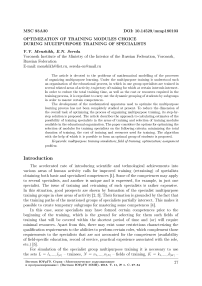Optimization of training modules choice during multipurpose training of specialists
Автор: Menshikh V.V., Sereda E.N.
Рубрика: Математическое моделирование
Статья в выпуске: 1 т.11, 2018 года.
Бесплатный доступ
The article is devoted to the problems of mathematical modelling of the processes of organizing multipurpose learning. Under the multipurpose training is understood such an organization of the educational process, in which in one group specialists are trained in several related areas of activity, trajectory of training for which at certain intervals intersect. In order to reduce the total training time, as well as the cost or resources required in the training process, it is expedient to carry out the dynamic grouping of students by subgroups in order to master certain competences. The development of the mathematical apparatus used to optimize the multipurpose learning process has not been completely studied at present. To reduce the dimension of the overall task of optimizing the process of organizing multipurpose training, its step-by-step solution is proposed. The article describes the approach to calculating estimates of the possibility of training specialists in the areas of training and selection of training modules available in the educational organization. The paper considers the options for optimizing the selection of modules for training specialists on the following criteria: minimizing the total duration of training, the cost of training and resources used for training. The algorithm with the help of which it is possible to form an optimal group of students is proposed.
Multipurpose training simulation, field of training, optimization, assignment problem
Короткий адрес: https://sciup.org/147159469
IDR: 147159469 | УДК: 519.168 | DOI: 10.14529/mmp180103
Список литературы Optimization of training modules choice during multipurpose training of specialists
- Зимняя, И.А. Ключевые компетенции -новая парадигма результата образования/И.А. Зимняя//Высшее образование сегодня. -2003. -№ 5. -C. 34-42.
- Kiriakidis, P. Research in Multidimention Education/P. Kiriakidis, P. Barber, J.W. Decota. -Iasi: Lumen, 2011.
- Kelly, K.P. Getting to the Goal in Professional Military Education/K.P. Kelly, J. Johnson-Freese//ORBIS. -2014. -V. 58, № 1. -P. 119-131.
- Денкс, К.А. Задача синтеза индивидуальных планов обучения в пространстве виртуальных учебных групп/К.А. Денкс, Ю.Ю. Якунин, Д.И. Ярещенко//Экономика, статистика и информатика. -2015. -№ 6. -С. 118-127.
- Меньших, В.В. Концептуальная модель и технология обучения коллективным действиям по принятию решений при возникновении чрезвычайных обстоятельств/В.В. Меньших, Е.Н. Середа//Труды Академии управления МВД России. -2016. -№ 2. -С. 51-56.
- Пахаренко, Н.В. Модель определения сформированности общекультурных и профессиональных компетенций/Н.В. Пахаренко, И.Н. Зольникова//Современные проблемы науки и образования. -2012. -№ 6. -URL: https://www.science-education.ru/ru/article/view?id=7502 (дата обращения: 9 февраля 2018 г.)
- Меньших, В.В. Моделирование процесса выбора траекторий обучения сотрудников органов внутренних дел действиям при чрезвычайных обстоятельствах/В.В. Меньших, Е.Н. Середа, А.Н. Копылов//Вестник Воронежского института МВД России. -2016. -№ 2. -С. 203-212.
- Бородин, Д.К. Математическое обеспечение планирования образовательного процесса/Д.К. Бородин, А.Б. Токарев//Качество. Инновации. Образование. -2008. -№ 8 (39). -С. 5-14.
- Саати, Т. Принятие решений: Метод анализа иерархий/Т. Саати. -М.: Радио и связь, 1993. -278 с.
- Меньших, В.В. Модель формирования групп для ролевого обучения принятию управленческих решений/В.В. Меньших, А.Ф. Самороковский, Е.Н. Середа//Вестник Воронежского института МВД России. -2015. -№ 2. -С. 107-114.
- Бурков, В.Н. Прикладные задачи теории графов/В.Н. Бурков, И.А. Горгидзе, С.Е. Ловецкий. -Тбилиси: Выч. центр АН ГССР, 1974. -231 с.


